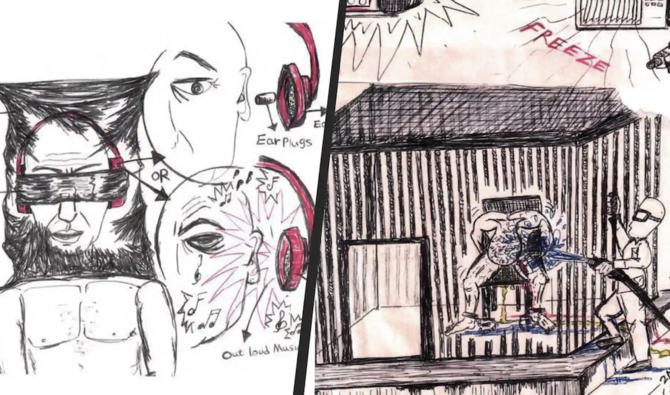LONDON: A Guantanamo Bay prisoner has revealed in detail the abuse and torture he said he suffered at the hands of US security forces at the infamous prison.
Abu Zubaydah, a stateless Palestinian who was detained by US forces in Faisalabad, Pakistan, in 2002, produced drawings of brutal treatment during his imprisonment and interrogation at various US “black sites” and Guantanamo Bay.
They were drawn from memory in his cell and sent to one of his lawyers, Professor Mark Denbeaux.
Denbeaux has co-authored a report based on Abu Zubaydah’s account titled “American Torturers: FBI and CIA Abuses at Dark Sites and Guantanamo,” a summary of which was published in the Guardian newspaper on Thursday, which offered an unprecedented insight into what the CIA calls its “enhanced interrogation techniques.”
His graphic drawings depict in detail various torture methods used by the CIA against him and other detainees, while also highlighting the “complicity” of FBI agents in the abuse and mistreatment of detainees, the report said.
Abu Zubaydah was the first detainee in the post-Sept. 11 terrorist attacks era to be experimented on using the EITs, which include slaps and punches to the body, waterboarding, direction of high-pressure cold water at the genitals and 24-hour use of loudspeakers and cold air while chained to a cell wall.
Following his capture by US forces, he was moved from Pakistan to a black site in Thailand, and over the course of four years suffered abuse and torture at CIA black sites in Afghanistan, Lithuania, Poland and Morocco before being transferred to the US military prison at Guantanamo Bay in 2006.
The CIA and FBI have acknowledged Abu Zubaydah was not a member of Al-Qaeda as initially suspected and that his case was one of “mistaken identity,” but he has been imprisoned without charge or trial ever since.
His treatment has been criticized by the UN Working Group on Arbitrary Detention as having “no lawful basis.” The withdrawing of his freedoms constituted a “crime against humanity” and the UK was “jointly responsible for the torture and cruel, inhumane or degrading treatment of Mr. Zubaydah,” the group added.
“Not only are these drawings a powerful testament to what the CIA and FBI did in the wake of 9/11, they are the only evidence now,” the Center for Policy and Research report authors Denbeaux and Jess Ghannam said.
“The CIA destroyed the only video evidence of detainee torture, and ‘justice’ moves at a glacial pace in the Guantanamo Bay, Military Commission courtroom, 19 years have been wasted while Mr. Abu Zubaydah and many other GTMO prisoners have neither been charged with a crime, nor allowed to testify,” they added.
Meanwhile, Moazzam Begg, a former Guantanamo Bay prisoner and outreach director at London-based advocacy group for War on Terror victims CAGE, said Abu Zubaydah’s drawings will be key in highlighting what has gone on at Guantanamo Bay.
“They call him the ‘forever prisoner’ because, despite facing no charge or trial in 21 years, they fear to release Abu Zubaydah not because of what he did but what was done to him,” he said.
“In truth, it will be forever be remembered that the US’ 21st-century medieval torture program was invented against a stateless Palestinian and it was his case that caused the United Nations to finally describe Guantanamo as a ‘crime against humanity.’
“Abu Zubaydah is innocent according to the law so he must be released, and when he’s free, his iconic self-portraits of CIA torture featured in the report will have done their job.”


























